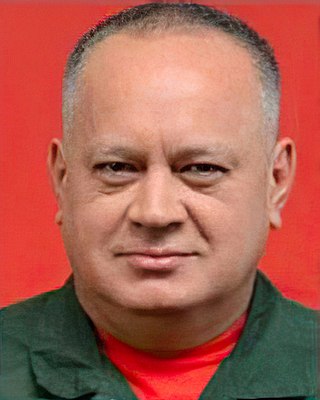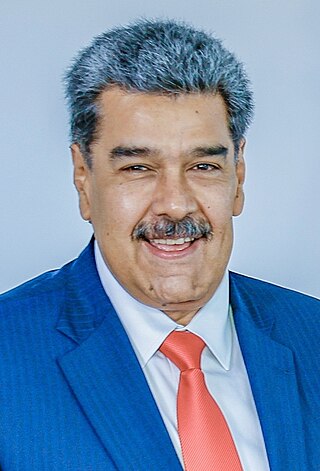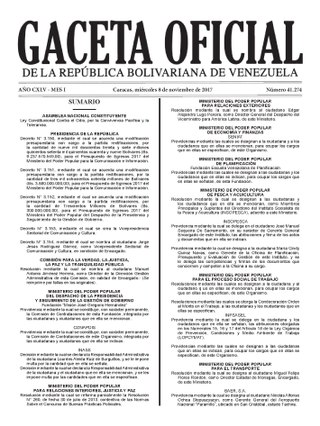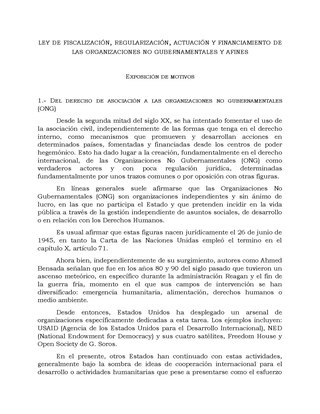
Diosdado Cabello Rondón is a Venezuelan politician who currently serves as Minister of Interior, Justice and Peace since 2024. Cabello is a former member of the National Assembly of Venezuela, where he previously served as Speaker. He is also an active member of the Venezuelan armed forces, with the rank of captain.

The National Electoral Council is the head of one of the five branches of government of Venezuela under its 1999 constitution. It is the institution that has the responsibility of overseeing and guaranteeing the transparency of all elections and referendums in Venezuela at the local, regional, and national levels. The creation of the CNE was ratified in Venezuela's 1999 constitutional referendum. Following the election of Nicolás Maduro into the presidency, the CNE has been described, by the president's opponents, as being pro-Maduro.

The Supreme Justice Tribunal is the highest court of law in the Bolivarian Republic of Venezuela and is the head of the judicial branch. As the independence of the Venezuelan judiciary under the regime of Nicolás Maduro is questioned, there have recently been many disputes as to whether this court is legitimate.

María Corina Machado Parisca is a Venezuelan opposition politician and industrial engineer who served as an elected member of the National Assembly of Venezuela from 2011 to 2014. Machado entered politics in 2002 as the founder and leader of the vote-monitoring group Súmate, alongside Alejandro Plaz. In 2018, she was listed as one of BBC's 100 Women. Machado is regarded as a leading figure of the Venezuelan opposition; the Nicolás Maduro government in Venezuela has banned Machado from leaving Venezuela.
Chavismo, also known in English as Chavism or Chavezism, is a left-wing populist political ideology based on the ideas, programs and government style associated with the Venezuelan President between 1999 and 2013 Hugo Chávez that combines elements of democratic socialism, socialist patriotism, Bolivarianism, and Latin American integration. People who supported Hugo Chávez and Chavismo are known as Chavistas.

Concentrazione Antifascista Italiana, officially known as Concentrazione d'Azione Antifascista, was an Italian coalition of anti-fascist groups which existed from 1927 to 1934. It was formed in Paris on 27 March 1927 with the purpose of the organization of Italian antifascist forces in order to reorganize the anti-fascist movement abroad avoiding to repeat the old divisions existing in Italy before the establishment of the regime. The CAI made a public appeal signed by Claudio Treves and Giuseppe Emanuele Modigliani (PSLI), Pietro Nenni and Angelica Balabanoff (PSI), Fernando Schiavetti and Mario Pistocchi, Bruno Buozzi and Felice Quaglino (CGdL) and by Alceste De Ambris. Communists remained outside along with liberals, populars and others in order to keep contact with Italian masses "in their social defence and political resistance moves". The official weekly newspaper La Libertà was created on 1 May 1927 with Claudio Treves as director.

Nicolás Maduro Moros is a Venezuelan politician and the 53rd president of Venezuela since 2013. Previously, he was the 24th vice president of Venezuela from 2012 to 2013, the minister of foreign affairs from 2006 to 2012, and the 3rd president of the National Assembly of Venezuela from 2005 to 2006.

Censorship in Venezuela refers to all actions which can be considered as suppression in speech in the country. More recently, Reporters Without Borders ranked Venezuela 159th out of 180 countries in its World Press Freedom Index 2023 and classified Venezuela's freedom of information in the "very difficult situation" level.

Tibisay Lucena Ramírez was a Venezuelan politician, president of the National Electoral Council (CNE) between 2006 and 2020, one of the five branches of government of Venezuela. Since 2017, Lucena was sanctioned by several countries for her role in undermining democracy and human rights in the country.

Aporrea is a Venezuelan website that publishes news and opinions from the point of view of supporters of former President Hugo Chávez and the Bolivarian Revolution. It ranks as the fourth most visited local political site in the country, according to site metrics Alexa.com, and it claims to be the first among local independent left-leaning outlets. Most of the site's content was supportive of the political changes promoted by late president Hugo Chávez, but in recent years, it has content critical of the current government led by Chavez's protégé Nicolás Maduro, turning it into a "gathering place for dissidence within chavismo".

Delcy Eloína Rodríguez Gómez is a Venezuelan lawyer, diplomat, and politician who has served as the vice president of Venezuela since 2018. Rodríguez has held several positions during the presidencies of Hugo Chávez and Nicolás Maduro. She was Minister of Popular Power for Communication and Information of Venezuela from 2013 to 2014, Minister of Foreign Affairs from 2014 to 2017 and President of the Constituent Assembly of Venezuela from 4 August 2017 to 14 June 2018 until her retirement from that office to assume the vice presidency of the country. Since 2024 she holds the position of Minister of Petroleum. She is a member of the national leadership of the United Socialist Party of Venezuela. The European Union, the United States and Canada have placed sanctions on her for what they said were human rights violations and her role in the political crisis in the country.

Parliamentary elections were held in Venezuela on 6 December 2015 to elect the 164 deputies and three indigenous representatives of the National Assembly. They were the fourth parliamentary elections to take place after the 1999 constitution, which abolished the bicameral system in favour of a unicameral parliament, and the first to take place after the death of President Hugo Chávez. Despite predictions from the opposition of a possible last-minute cancellation, the elections took place as scheduled, with the majority of polls showing the Democratic Unity Roundtable (MUD) holding a wide lead over the ruling United Socialist Party of Venezuela (PSUV) and its wider alliance, the Great Patriotic Pole (GPP).

On 29 March 2017, the Supreme Tribunal of Justice (TSJ) of Venezuela took over legislative powers of the National Assembly. The Tribunal, mainly supporters of President Nicolás Maduro, also restricted the immunity granted to the Assembly's members, who mostly belonged to the opposition.

Juan Gerardo Antonio Guaidó Márquez is a Venezuelan opposition politician. He belonged to the social-democratic party Popular Will, and was a federal deputy to the National Assembly representing the state of Vargas.
Freddy Superlano Salinas is a Venezuelan politician, educator and engineer who served as a member for the Popular Will party in the National Assembly from 2016 to 2021. He is an outspoken critic of Nicolás Maduro and the United Socialist Party of Venezuela. He was also a candidate for the governor of Barinas state for the Democratic Unity Roundtable in the 2017 election, which he lost to the pro-government candidate Argenis Chávez.

Presidential elections were held in Venezuela on 28 July 2024 to choose a president for a six-year term beginning on 10 January 2025. The election was politically contentious, with international monitors calling it neither free nor fair, citing the incumbent Maduro administration having controlled most institutions and repressed the political opposition before, during, and after the election. Widely viewed as having won the election, former diplomat Edmundo González Urrutia fled to asylum in Spain amid repression of dissent and a national and international political crisis that resulted when Venezuelan electoral authorities announced—"without presenting any evidence", according to The Sunday Times—that Nicolás Maduro won.

The Constitutional Law Against Hatred, for Peaceful Coexistence and Tolerance, also known simply as the Law Against Hatred, is a law passed unanimously by the Venezuelan Constituent National Assembly and published in Gaceta Oficial 41,274 on 8 November 2017.
Con El Mazo Dando is a Venezuelan television programme. It is transmitted every Wednesdays at 7pm on Venezolana de Televisión and TVes. It is hosted by Diosdado Cabello. Its sister broadcast Nos Vemos en la Radio is also broadcast on Radio Nacional de Venezuela.

Regional and municipal elections were held in Venezuela on 21 November 2021. In the elections, all executive and legislative positions of the 23 federal entities, as well as that of the 335 municipalities of the country, were renewed.

The Law on Control, Regularization, Operations and Financing of Non-Governmental and Related Organisation, also known colloquially as the Anti-Society Law, is a law approved by the V Legislature of the National Assembly of Venezuela, with a pro-government majority, presented in first discussion on 24 January 2023. The law is currently in second discussion in the National Assembly, since 9 January 2024.

















